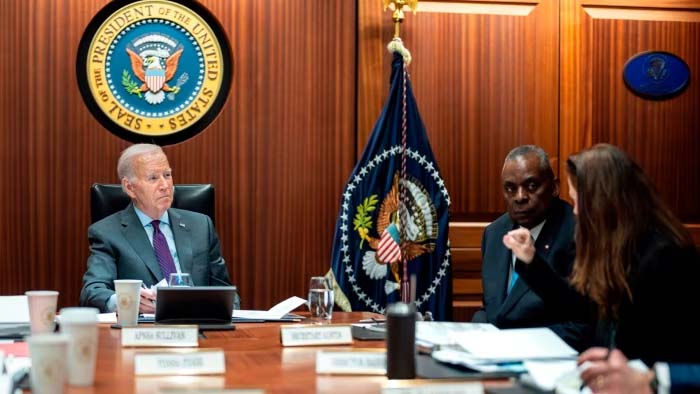Washington, D.C. – On Sunday, the United States underscored its role in aiding Israel in countering Iran’s aerial offensive. President Joe Biden convened the leaders of the Group of Seven (G7) nations to avoid a broader regional escalation and orchestrate a global condemnation of Tehran’s actions.
U.S. support enabled Israel to intercept and down numerous drones and missiles from Iran on Saturday, marking Iran’s first direct military assault on Israel. Israeli officials confirmed that 99% of the incoming armaments were neutralized without causing significant damage.
U.S. authorities emphasized that despite the high success rate of the interceptions, Iran’s goal was to inflict destruction and casualties. Successful strikes could have triggered a “chaotic” escalation across the Middle East. In a bid to manage tensions, President Biden informed Israeli Prime Minister Benjamin Netanyahu that the U.S. would not engage in any offensive operations against Iran. The president stressed the need to carefully assess risks of escalation.
The U.S. urge for restraint aligned with its ongoing efforts to limit Israel’s conflict with Hamas in Gaza, now in its seventh month, and protect civilians in the region.
U.S. and allied preparations were in place for days before the attack, which exceeded expectations. The launches were intense, with 100 ballistic missiles launched simultaneously toward Israel with only minutes of flight time. Biden and senior officials monitored the situation in real-time in the White House Situation Room. Relief ensued upon seeing the success of missile defense measures.
The Pentagon noted U.S. Central and European Command forces destroyed more than 80 attack drones and at least six ballistic missiles aimed at Israel from Iran and Yemen.
“Per my instructions to support Israel’s defense, U.S. forces deployed aircraft and missile defense destroyers to the region over the past week,” Biden stated late Saturday. “Thanks to these deployments and our skilled personnel, we helped Israel eliminate nearly all incoming drones and missiles.”
Administration officials stated the call reaffirmed the “unshakable” U.S. commitment to Israel’s defense and willingness to mount similar operations if required.
Officials dismissed the notion that Iran allowed Israel and the U.S. time to prepare for an attack. They instead used the preparation time as an advantage in responding. Iran communicated with the U.S. during the attack, signaling it was the full extent of their response. The message was conveyed via Switzerland due to the absence of direct diplomatic ties between the U.S. and Iran.
In a call with Netanyahu on Saturday evening, Biden urged Israel to acknowledge its defensive prowess and advised against broader retaliatory actions against Iran.
“I commended Israel’s outstanding defensive abilities against unprecedented attacks, conveying a message to its adversaries that threatening Israel’s security is ineffective,” Biden said in his post-call statement.
Biden spoke with Jordan’s King Abdullah II on Sunday, who cautioned that Israel’s escalatory measures would lead to a broader regional conflict. The leaders discussed Gaza, reaffirming their collaboration to resolve the crisis swiftly.
The president also engaged with U.S. forces involved in downing the Iranian drones.
Later, Biden consulted congressional leaders about the urgent need to pass additional wartime funding for Israel and Ukraine.
Secretary of State Antony Blinken engaged with foreign ministers from Egypt, Jordan, Saudi Arabia, and Turkey on Sunday, stressing the “importance of averting escalation and coordinating a diplomatic response,” according to a department spokesman.
Following the G7 videoconference on Sunday, leaders issued a joint statement condemning Iran’s direct attack on Israel and reaffirming support for its security.
The G7, consisting of the U.S., Italy, Japan, Germany, France, Britain, and Canada, asserted that Iran’s actions could further destabilize the region and provoke uncontrollable escalation. They pledged readiness to take further measures in response to destabilizing acts.
A senior U.S. official noted that discussions included potential designations of Iran’s Revolutionary Guard Corps as a terrorist organization and additional sanctions on Tehran, though no final decisions were reached.
The G7 statement also referenced the Israel-Hamas war, emphasizing ongoing cooperation to resolve the crisis in Gaza, including immediate and lasting ceasefires and increased humanitarian aid to Palestinians.
The United Nations Security Council convened an emergency meeting on Sunday to discuss the attack. “Now is the time to de-escalate and show maximum restraint,” said U.N. Secretary-General António Guterres.
Israeli Ambassador Gilad Erdan described the attack as an “unprecedented escalation,” while Iranian Ambassador Saeid Iravani claimed Iran’s actions were an exercise of its inherent right to self-defense.
Following the meeting, which ended without any council action, U.S. Deputy Ambassador Robert Wood stated, “A Security Council response is necessary to address last night’s events.”
The U.S. and Israel anticipated an attack for days, especially after Iran vowed retaliation for a recent suspected Israeli strike on an Iranian consulate in Syria, which killed 12, including two senior Iranian generals from the Revolutionary Guard’s Quds Force.
Florida Senator Marco Rubio, the top Republican on the Senate Intelligence Committee, criticized the White House for “leaking to the press” Biden’s conversation with Netanyahu about claiming victory and avoiding retaliation.
Rubio told CNN’s “State of the Union” that such actions were part of the White House’s efforts to placate calls for a ceasefire in Gaza.









